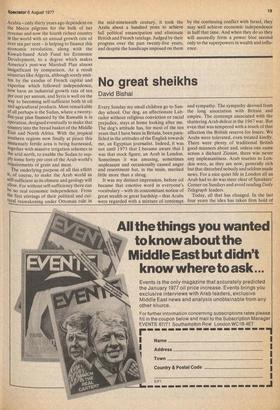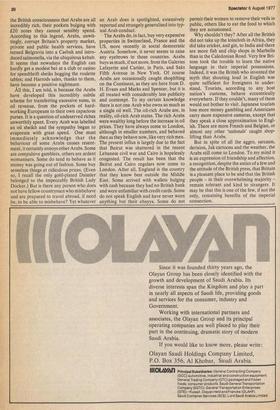No great sheikhs
David Bishai
Every Sunday my small children go to Sunday school. Our dog, an affectionate Labrador without religious conviction or racial prejudice, stays at home looking after me. The dog's attitude has, for most of the ten years that I have been in Britain, been paralleled in the attitudes of the English towards me, an Egyptian journalist. Indeed, it was not until 1973 that I became aware that I was that stock figure, an Arab in London. Sometimes it was amusing, sometimes unpleasant and occasionally caused anger and resentment but, in the main, merited little more than a shrug.
It was my distinct impression, before oil became that emotive word in everyone's vocabulary — with its concomitant notion of great wealth or great hardship — that Arabs were regarded with a mixture of contempt
and sympathy. The sympathy derived from the long association with Britain and empire. The contempt associated with the shattering Arab defeat in the 1967 war. But even that was tempered with a touch of that affection the British reserve for losers. We Arabs were tolerated, even treated kindly. There were plenty of traditional British good manners about and, unless one came across a diehard Zionist, there was never any unpleasantness. Arab tourists to London were, as they are now, generally rich but that disturbed nobody and seldom made news. For a nice quiet life in London all an Arab had to do was steer clear of Speakers' Corner on Sundays and avoid reading Daily Telegraph leaders.
Today, all that has changed. In the last four years the idea has taken firm hold of the British consciousness that Arabs are all incredibly rich, their pockets bulging with £20 notes they cannot sensibly spend. According to this legend, Arabs, unwittingly, corrupt Britain's property market, private and public health services, have turned Belgravia into a Casbah and introduced salmonella, via the ubiquitous kebab. It seems that nowadays the English can hardly get a modest bet at a club or casino for spendthrift sheiks hogging the roulette tables; and Harrods sales, thanks to them, have become a positive nightmare. All this, I am told, is because the Arabs have developed this incredibly subtle scheme for transferring excessive sums, in oil revenue, from the pockets of hardworking Europeans to their own capacious purses. It is a question of undeserved riches unworthily spent. Every Arab was labelled an oil sheikh and the sympathy began to evaporate with great speed. One must immediately acknowledge that the behaviour of some Arabs causes resentment, it certainly annoys other Arabs. Some are compulsive gamblers, others are ardent womanisers. Some do tend to behave as ii money was going out of fashion. Some buy senseless things at ridiculous prices. (Even so, I recall the only gold-plated Daimler belonged to the impeccably British Lady Docker.) But is there any person who does not have fellow countrymen who misbehave and are prepared to travel abroad, if need. be, to be able to misbehave? Yet whatever an Arab does is spotlighted, extensively reported and strangely generalised into typical Arab conduct.
The Arabs do, in fact, buy very expensive properties in Switzerland, France and the US, more recently in social democratic Austria. Somehow, it never seems to raise any eyebrows in those countries. Arabs buys as much, if not more, from the Galeries Lafayette and Cartier, in Paris, and Saks Fifth Avenue in New York. Of course Arabs are occasionally caught shoplifting on the Continent, as they are here from D. H. Evans and Marks and Spencer, but it is all treated with considerably less publicity and contempt. To my certain knowledge there is not one Arab who owns so much as a single oil well. The oil-rich Arabs are, in reality, oil-rich Arab states. The rich Arabs were wealthy long before the increase in oil prices. They have always come to London, although in smaller numbers, and behaved then as they behave now, like very rich men. The present influx is largely due to the fact that Beirut was shattered in the recent Lebanese civil war and Cairo is hopelessly congested. The result has been that the Beirut and Cairo regulars now come to London. After all, England is the country that they know best outside the Middle East. Some arrived with wallets bulging with cash because they had no British bank and were unfamiliar with credit cards. Some do not speak English and have never worn anything but their ebayya. Some do not permit their women to remove their veils in public, others like to eat the food to which they are accustomed.
Why shouldn't they? After all the British did not take up the loincloth in Africa, they did take cricket, and gin, to India and there are more fish and chip shops in Marbella than in the Caledonian Road. Very few Britons took the trouble to learn the native language in their imperial possessions. Indeed, it was the British who invented the myth that shouting loud in English was quite sufficient for foreigners to understand. Tourists, according to any host nation's customs, behave eccentrically everywhere. If they couldn't, many of them would not bother to visit. Japanese tourists lose more money gambling and Americans carry more expensive cameras, except that they speak a close approximation to English. There are more French and Belgian, or almost any other 'nationals' caught shoplifting than Arabs.
But in spite of all the aggro, sarcasm, derision, Jak cartoons and the weather, the Arabs still come to London. To my mind it is an expression of friendship and affection, a recognition, despite the antics of a few and the attitude of the British press, that Britain is a pleasant place to be and that the British people — in their overwhelming majority — remain tolerant and kind to strangers. It may be that this is one of the few, if not the only, remaining benefits of the imperial connection.











































 Previous page
Previous page